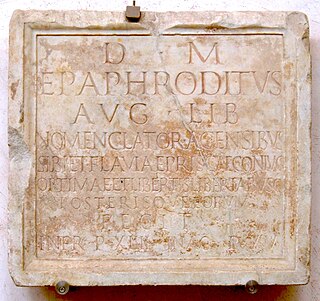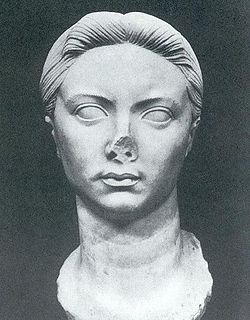Related Research Articles

Julia Agrippina, also referred to as Agrippina the Younger, was a Roman empress.

Nero Claudius Caesar Augustus Germanicus, originally named Lucius Domitius Ahenobarbus, was the fifth emperor of Rome, and the last in the Julio-Claudian dynasty line of emperors. He was adopted by the Roman emperor Claudius at the age of thirteen, and succeeded him to the throne at the age of seventeen. Nero was popular with the lower-class Roman citizens during his time and his reign is commonly associated with unrestricted tyranny, extravagance, religious persecution and debauchery.

Marcus Annaeus Lucanus, better known in English as Lucan, was a Roman poet, born in Corduba, in Hispania Baetica. He is regarded as one of the outstanding figures of the Imperial Latin period, known in particular for his epic Pharsalia. His youth and speed of composition set him apart from other poets.

Lucius Annaeus Seneca the Younger, usually known as Seneca, was a Roman Stoic philosopher, statesman, dramatist, and in one work, satirist, from the post-Augustan age of Latin literature.
Ofonius Tigellinus, also known as Tigellinus Ofonius, Ophonius Tigellinus, Sophonius Tigellinus and Gaius Ofonius Tigellinus (c. 10–69), was a prefect of the Roman imperial bodyguard, known as the Praetorian Guard, from 62 until 68, during the reign of emperor Nero. Tigellinus gained imperial favour through his acquaintance with Nero's mother Agrippina the Younger, and was appointed prefect upon the death of his predecessor Sextus Afranius Burrus, a position Tigellinus held first with Faenius Rufus and then Nymphidius Sabinus.
Gnaeus Calpurnius Piso, was a Roman statesman during the reigns of Augustus and Tiberius. He served as consul in 7 BC, after which he was appointed governor of Hispania and consul of Africa. He belonged to one of Rome's most distinguished senatorial families, whose members included Calpurnia, third wife of Julius Caesar.

Poppaea Sabina was a Roman Empress as the second wife of the Emperor Nero. She had also been wife to the future emperor Otho. The historians of antiquity describe her as a beautiful woman who used intrigues to become empress.

Epaphroditos, Tiberios Klaudios Epaphroditos or Tiberius Claudius Epaphroditus or Epaphroditus, was a freedman and secretary of the Roman Emperor Nero. He was later executed by Domitian for failing to prevent Nero's suicide.

Vipsania Agrippina was the first wife of the Emperor Tiberius. She was the daughter of Marcus Vipsanius Agrippa and Pomponia Caecilia Attica, thus a granddaughter of Titus Pomponius Atticus, the best friend of Cicero.

The conspiracy of Gaius Calpurnius Piso in AD 65 was a major turning point in the reign of the Roman emperor Nero. The plot reflected the growing discontent among the ruling class of the Roman state with Nero's increasingly despotic leadership, and as a result is a significant event on the road toward his eventual suicide and the chaos of the Year of the Four Emperors which followed.
Marcus Trebellius Maximus was a Roman senator active during the reign of Nero. He was suffect consul for the nundinium of May to June 55 AD as the colleague of Seneca the Younger, replacing Publius Cornelius Dolabella.

Lucius Junius Gallio Annaeanus or Gallio was a Roman senator and brother of the famous writer Seneca. He is best known for dismissing an accusation brought against Paul the Apostle in Corinth.

The gens Calpurnia was a plebeian family at ancient Rome, which first appears in history during the third century BC. The first of the gens to obtain the consulship was Gaius Calpurnius Piso in 180 BC, but from this time their consulships were very frequent, and the family of the Pisones became one of the most illustrious in the Roman state. Two important pieces of Republican legislation, the lex Calpurnia of 149 BC and lex Acilia Calpurnia of 67 BC were passed by members of the gens.

Pompeia Paulina was the wife of the statesman, philosopher, and orator Lucius Annaeus Seneca, and she was part of a circle of educated Romans who sought to lead a principled life under the emperor Nero. She was likely the daughter of Pompeius Paulinus, an eques from Arelate in Gaul. Seneca was the emperor's tutor and later became his political adviser and minister. In 65 AD Nero demanded that Seneca commit suicide, having accused Seneca of taking part in the Pisonian conspiracy against him. Paulina attempted to die with her husband, but survived the suicide attempt.
Antonius Natalis was an ancient Roman of the equestrian order who took part in the Pisonian conspiracy against Nero. As a conspirator, he provided Gaius Calpurnius Piso with secretive information regarding the emperor. After Flavius Scaevinus's freedman, Milichus, alerted Nero of Piso's conspiracy, Natalis, having met with Scaevinus that day, was suspected of being a part of the conspiracy. When he was questioned, Natalis disclosed information vital to the conspiracy, thereby avoiding punishment.

Lucius Calpurnius Piso was a Roman senator active in the first century AD. During the Year of Four Emperors he was governor of Africa and supported Vitellius. After the death of Vitellius he was killed by supporters of Vespasian.

The Stoic Opposition is the name given to a group of Stoic philosophers who actively opposed the autocratic rule of certain emperors in the 1st-century, particularly Nero and Domitian. Most prominent among them was Thrasea Paetus, an influential Roman senator executed by Nero. They were held in high regard by the later Stoics Epictetus and Marcus Aurelius. Thrasea, Rubellius Plautus and Barea Soranus were reputedly students of the famous Stoic teacher Musonius Rufus and as all three were executed by Nero they became known collectively as the 'Stoic Martyrs'.
Marcus Julius Vestinus Atticus was a Roman senator, who flourished under the reign of Nero. He was consul in the year 65 as the colleague of Aulus Licinius Nerva Silianus; after his suicide he was replaced by Publius Pasidienus Firmus.
The gens Subria was an obscure plebeian family at ancient Rome. Few members of this gens are mentioned in history, but others are known from inscriptions.